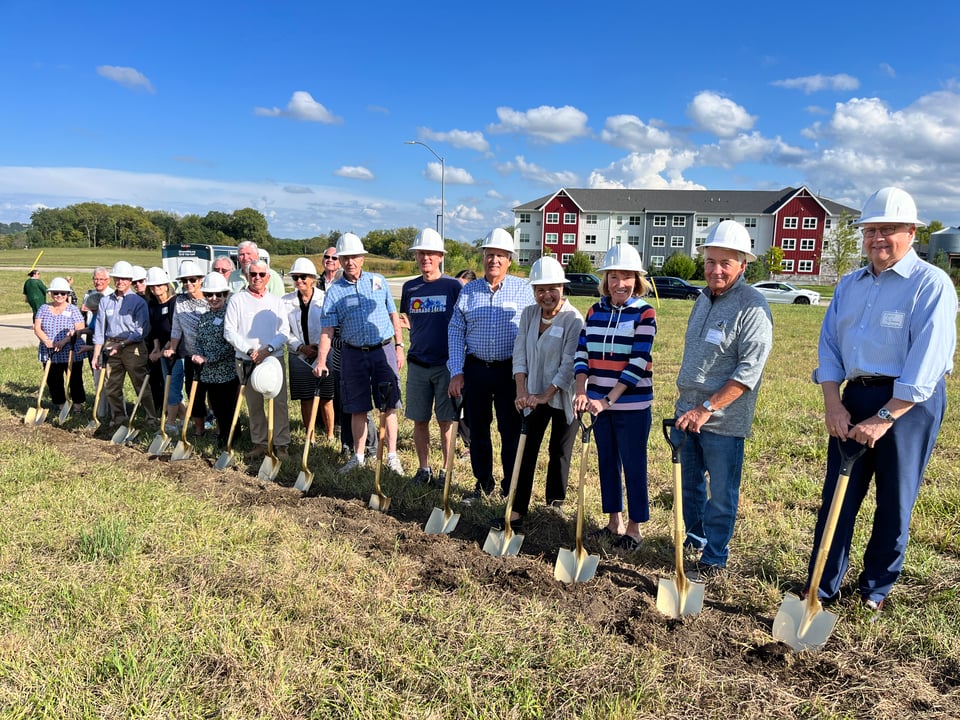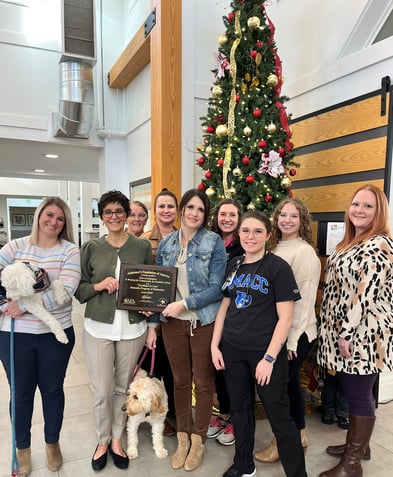 Brio of Johnston, a WesleyLife Community for Healthy Living in Johnston, Iowa, has joined only 22 other communities in the nation as a Dementia "Excellence in Care" Program of Distinction.
Brio of Johnston, a WesleyLife Community for Healthy Living in Johnston, Iowa, has joined only 22 other communities in the nation as a Dementia "Excellence in Care" Program of Distinction.The honor, bestowed by the Alzheimer's Foundation of America, was made official with a plaque that arrived last week. Executive Director Teresa Krueger and her team learned earlier this year that Brio is the only Iowa community that has been awarded the honor.
"It means so much to have our unique dementia household recognized as a place where people can live life with joy, fostered by purposeful care and programming," Teresa, who has been at Brio's helm since its opening in 2018 and is shown in the blue jacket, says. "In our household, we live in the world of the people we serve. Even if the disease has robbed the person of conventional means of expression, they're still 'in there.' We recognize that spark and we work to encourage the best quality of life."
Brio's dementia household is a licensed CCDI location -- CCDI stands for "chronic confusion or dementing illness" -- which differs from communities that offer memory support in an assisted-living or related setting. CCDI memory care employs team members who are specially trained to care for those with Alzheimer's and other dementias, and their focus is entirely on the care, safety, and quality of life of people living with a memory-related challenge.
"It means so much to have our unique dementia household recognized as a place where people can live life with joy, fostered by purposeful care and programming," Teresa, who has been at Brio's helm since its opening in 2018 and is shown in the blue jacket, says. "In our household, we live in the world of the people we serve. Even if the disease has robbed the person of conventional means of expression, they're still 'in there.' We recognize that spark and we work to encourage the best quality of life."
Brio's dementia household is a licensed CCDI location -- CCDI stands for "chronic confusion or dementing illness" -- which differs from communities that offer memory support in an assisted-living or related setting. CCDI memory care employs team members who are specially trained to care for those with Alzheimer's and other dementias, and their focus is entirely on the care, safety, and quality of life of people living with a memory-related challenge.
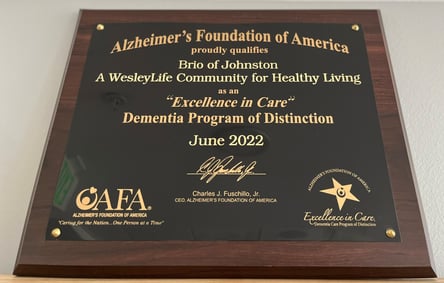 "I knew when I came to Brio that this was the kind of environment I wanted our team to develop, and the fact that we are being recognized for this could not be more important to all of us," Teresa says.
"I knew when I came to Brio that this was the kind of environment I wanted our team to develop, and the fact that we are being recognized for this could not be more important to all of us," Teresa says. "I'm grateful that the Alzheimer's Foundation representatives saw and understood during their time here evaluating us that every part of our household, from what's on the walls to the music that's playing to the way we serve meals, is deliberate, and that our residents have the opportunity to thrive."
Brio Sales Director Maria Jordan, shown below, who nominated Brio for the distinction, witnesses the dedication and commitment on the part of team members in the household, Elan Cottage, daily. But she's also experienced it as a family member; both her parents have been served in the household, and she will always feel grateful that they have been treated with the utmost respect and compassion.
Brio Sales Director Maria Jordan, shown below, who nominated Brio for the distinction, witnesses the dedication and commitment on the part of team members in the household, Elan Cottage, daily. But she's also experienced it as a family member; both her parents have been served in the household, and she will always feel grateful that they have been treated with the utmost respect and compassion.
"They were not just bodies or room numbers; they were individuals who deserved every chance at a continued good life," Maria says. "As a daughter, one thing that impressed me so much was when they came here, my siblings and I were asked questions like, 'Who were they before they got sick? What did they do for a living? What did they enjoy?' They were treated like individuals. They were not just 'so-and-so with dementia.' They were loved here, and all our residents feel that love."
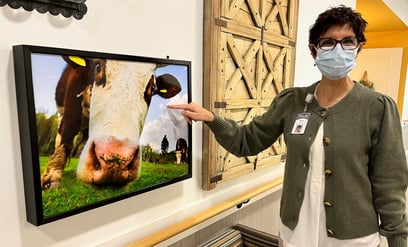 Teresa explains that programming in Elan Cottage is designed to stimulate without overstimulating; from activities to music to artwork to "stations" featuring cooking supplies or dress-up clothes, the intention is to stimulate positive memories to that residents will feel compelled to comfortably take part in the world around them. When a person presses a cow-themed print in one of the hallways, the cow moos; other artwork features bells that can be rung or mechanical tools that can be manipulated.
Teresa explains that programming in Elan Cottage is designed to stimulate without overstimulating; from activities to music to artwork to "stations" featuring cooking supplies or dress-up clothes, the intention is to stimulate positive memories to that residents will feel compelled to comfortably take part in the world around them. When a person presses a cow-themed print in one of the hallways, the cow moos; other artwork features bells that can be rung or mechanical tools that can be manipulated.
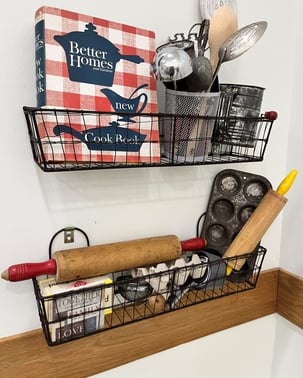 "It's also important to have our environment be calming so that residents feel safe, relaxed, and cared for," Teresa says. "When we have a feeling of calm and well-being, we don't see the agitated behaviors that are sometimes a part of life with dementia. Everyone just seems better and more content."
"It's also important to have our environment be calming so that residents feel safe, relaxed, and cared for," Teresa says. "When we have a feeling of calm and well-being, we don't see the agitated behaviors that are sometimes a part of life with dementia. Everyone just seems better and more content."
Teresa also explains that touch is a critical part of serving people with Alzheimer's, saying people often turn inward after their diagnoses, not wanting to reach out physically to those around them and even sometimes shrinking back from contact, such as a hug.
 Teresa explains that programming in Elan Cottage is designed to stimulate without overstimulating; from activities to music to artwork to "stations" featuring cooking supplies or dress-up clothes, the intention is to stimulate positive memories to that residents will feel compelled to comfortably take part in the world around them. When a person presses a cow-themed print in one of the hallways, the cow moos; other artwork features bells that can be rung or mechanical tools that can be manipulated.
Teresa explains that programming in Elan Cottage is designed to stimulate without overstimulating; from activities to music to artwork to "stations" featuring cooking supplies or dress-up clothes, the intention is to stimulate positive memories to that residents will feel compelled to comfortably take part in the world around them. When a person presses a cow-themed print in one of the hallways, the cow moos; other artwork features bells that can be rung or mechanical tools that can be manipulated.  "It's also important to have our environment be calming so that residents feel safe, relaxed, and cared for," Teresa says. "When we have a feeling of calm and well-being, we don't see the agitated behaviors that are sometimes a part of life with dementia. Everyone just seems better and more content."
"It's also important to have our environment be calming so that residents feel safe, relaxed, and cared for," Teresa says. "When we have a feeling of calm and well-being, we don't see the agitated behaviors that are sometimes a part of life with dementia. Everyone just seems better and more content."Teresa also explains that touch is a critical part of serving people with Alzheimer's, saying people often turn inward after their diagnoses, not wanting to reach out physically to those around them and even sometimes shrinking back from contact, such as a hug.
"It's important that we offer a hand to hold or a little pat or a hug -- if the person doesn't want it, that's fine, and we don't push -- but people need touch and that doesn't change when they get sick," she says. "Sometimes, they'll begin to be comfortable with contact again. The other day, I was letting out my dogs, who spend a lot of time here with us, and one of the residents who keeps to herself came up to me and took my hand, and she and I just stood there holding hands."
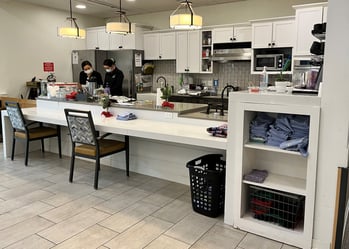 Another important part of Elan Cottage's programming; its "household" model of care enables residents to socialize together in a cozy living-room setting, and to request and help prepare their favorite meals and snacks in a communal kitchen/dining area. "Smells can really encourage a person to remember -- whether it's a favorite cookie baking, or a turkey on a holiday, or even bacon and eggs in the morning, the kitchen provides an important focal point for the residents," Maria says.
Another important part of Elan Cottage's programming; its "household" model of care enables residents to socialize together in a cozy living-room setting, and to request and help prepare their favorite meals and snacks in a communal kitchen/dining area. "Smells can really encourage a person to remember -- whether it's a favorite cookie baking, or a turkey on a holiday, or even bacon and eggs in the morning, the kitchen provides an important focal point for the residents," Maria says.Brio also offers assistance for family members -- "caring for caregivers is so important," Maria notes -- and innovative programming such as animal therapy (the household has pets!) and music therapy, using favorite songs to stimulate memory and a sense of belonging. Elan Cottage serves 16 residents, and Teresa is often called upon by communities outside the WesleyLife family for advice on creating the kinds of environments where people with memory challenges can thrive.
"I consider this my life's work, and I am so proud of my team; every one of them deserves so much gratitude and praise for making Brio such a special place," Teresa says. "Ultimately, being recognized this way can help family members understand that even after a dementia diagnosis, there is still hope, and there can still be a good life."
For information on the Foundation's selection criteria, visit their site. For more information on Brio, visit the community's page, or call Maria at (515) 252-5380.


